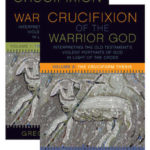We run our website the way we wished the whole internet worked: we provide high quality original content with no ads. We are funded solely by your direct support. Please consider supporting this project.

God’s Heart to Prevent Judgment
In Ezekiel we read a passage that depicts Yahweh as warning his people about their impending punishment by saying, “I will pour out my wrath on you and breathe out my fiery anger against you” (Ezek 21:31a). As we find in several other texts, Yahweh is here depicted as a ferocious fire-breathing dragon—a portrait that is, significantly enough, not unlike the way sinister cosmic monsters were sometimes depicted in ANE literature (e.g., Job 41:19-21; cf., 2 Sam 22:9; Ps 18:8; Jer 5:14).
Yet, at the same time, we can discern that “something else is going on” as the Spirit breaks through to clarify what will actually take place when his “wrath” and “fiery angry” are breathed out. Referring to the king of Babylon, Nebuchadnezzar, and his vicious warriors, Ezekiel recounts the Lord saying; “I will deliver you into the hands of brutal men, men skilled in destruction” (Ezek 21:31b). This alone is enough to demonstrate that the wrathful fire that Yahweh the ferocious dragon breathes out is nothing else but the destruction that “brutal men” will bring once Yahweh stops preventing them from expressing the destroying violence that is in their heart.
What makes Ezekiel’s account particularly significant is the remarkable role Ezekiel ascribes to individual choices (e.g., Ezek 18). Some argue that this speech pattern—where God is depicted as doing something that humans actually do—indicates that God controls the violence carried out by wicked humans and cosmic agents. Rather, Ezekiel consistently depicts people as having the power to condition what God does and even to thwart his plans.
As it concerns the Babylonian siege to which this passage refers, Ezekiel depicts the Lord unsuccessfully trying to prevent this judgment. At one point, we find Yahweh telling Ezekiel that he searched for someone to “stand before me in the gap … so I would not have to destroy it” (22:30). This statement reflects the truth that Yahweh only withdraws and allows destructive agents to carry out their wicked schemes as a divine judgment on people when he sees he has no other choice.
But it also reflects the truth that Yahweh was not meticulously controlling the characters involved in this narrative. How else are we to make sense of Yahweh failing to get people to intercede for the nation if he is meticulously controlling the people in question?
Of course, classical exegetes would respond by contending that Ezekiel’s depiction of God is an accommodation to the fallen limitations of the people God was working with. The trouble with this position is that it depends upon the classical philosophic view of God, not one defined by the revelation of Jesus on the cross. If we start with the revelation of God in the Christ, there is simply no reason to see this as an accommodation, for there is nothing about the revelation of God in Christ that rules out God unsuccessfully attempting to accomplish things when these things depend on the cooperation of others. To the contrary, Jesus is frequently depicted as unsuccessfully trying to get people to receive his teaching and to submit to the rule of God (e.g., Lk 18:18-24).
On a different note, this passage reflects the remarkable power and authority God has assigned to prayer. The passage presumes that, had God succeeded in finding even one person to access the power and authority he assigned to prayer, the nation might have been spared. Unfortunately, despite his sincere efforts, God found no one to “stand … in the gap” to avert this judgment. And because of this, the Lord reluctantly concluded, “I will pour out my wrath on them and consume them with my fiery anger” (Ezek 22:30-31).
Here again God is portrayed as though he personally engages in violent behavior when he judges people. Yet, Ezekiel confirms that “something else is going on” when he immediately recounts the Lord stating that he planned to bring “down on their own heads all they have done” by handing them over as “plunder to the nations” (22:31; cf., 25:7). The fiery anger that consumes people is simply the violence of people recoiling back on them (Ps 7:16) as God withdraws and allows other violent-prone nations to vanquish them. And in this instance, the grief he experienced when he finally concluded he needed to do this is evident from the fact that he had tried beforehand to prevent it by raising up an intercessor to stand in the gap.
For more on understanding how God works in this way, see Greg’s new book Cross Vision, or join us for the Cross Vision Conference.
Photo credit: dnak via Visualhunt.com / CC BY
Category: General
Tags: Cruciform Theology, Judgment, Prayer
Topics: Interpreting Violent Pictures and Troubling Behaviors
Verse: Ezekiel 21, Ezekiel 22
Related Reading

Podcast: When We Pray for Our Leaders, What Should We Pray?
Greg talks about praying for our leaders. http://traffic.libsyn.com/askgregboyd/Episode_0072.mp3

Overview of Crucifixion of the Warrior God
Greg reviewed the content of his new book, Crucifixion of the Warrior God, as a part of the Woodland Hills Church Covenant Partner gathering on March 5, 2017. If you want a fairly succinct synopsis of the thesis of his book, look no further. Ten years ago, Greg set out to write a book justifying the…

Podcast: Would a Loving God Create a Box that Killed Anyone Who Touched It?
Greg discusses the Ark of the Covenant and it’s strange and violent nature. http://traffic.libsyn.com/askgregboyd/Episode_0266.mp3

Endorsements for Crucifixion of the Warrior God
Greg has gotten some really great endorsements for his upcoming Crucifixion of the Warrior God, so we thought we’d share them with all of you. If you want to learn more, you can go here. Enjoy! “We now have a plenitude of studies preoccupied with the vexed question of the violence of God in the Bible.…

Why God Sometimes “Can’t”
Greg continues his thoughts on sickness and spiritual warfare by addressing the question of why God “can’t” intervene in some circumstances of illness.

The Centrality of Christ in Hebrews, Part 1
The intense Christocentricity that the New Testament writers embrace is nowhere more clearly and consistently illustrated than in the book of Hebrews. Throughout this work we find a repeated emphasis on the many ways the revelation given to us in Christ surpasses that of the Old Testament. The author begins by stressing how the revelation…
